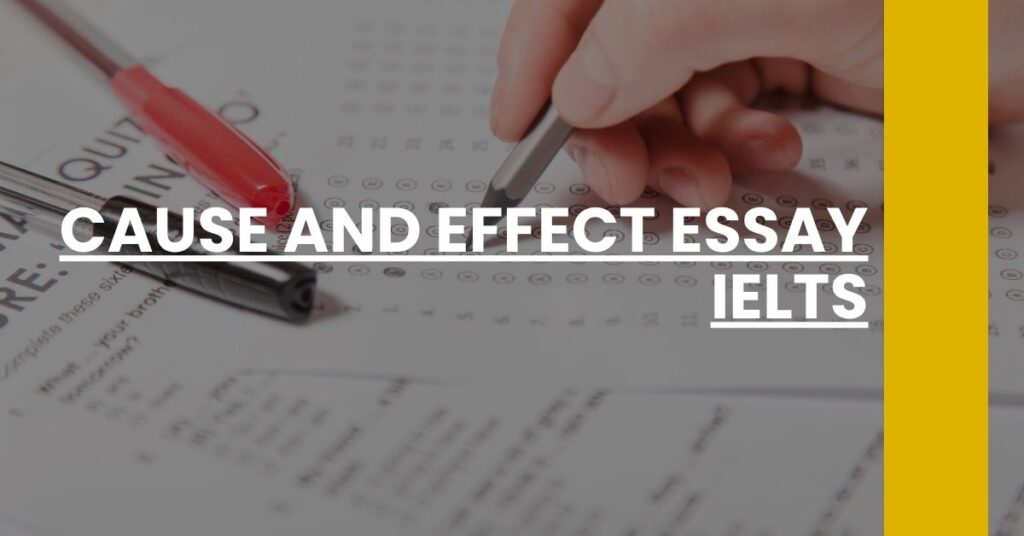Mastering the cause and effect essay IELTS segment can set you on the path to high scoring writing success.
- Crucial Components: Master the fundamentals of a compelling introduction, thesis statement, and impactful conclusions.
- Skillful Structuring: Understand how to weave coherent and logically structured body paragraphs for your cause and effect essay.
- Effective Examples: Learn from top-scoring IELTS essays, handling cause and effect with finesse.
Elevate your cause and effect essay IELTS writing with precision and clarity.
- Understanding the Cause and Effect Essay in IELTS
- Key Elements of a High-Scoring IELTS Cause and Effect Essay
- Step-by-Step Guide to Writing a Cause and Effect Essay for IELTS
- Choosing Your Cause and Effect Essay Topic for IELTS
- Common Mistakes to Avoid in IELTS Cause and Effect Essays
- Practical Examples of IELTS Cause and Effect Essays
- Enhancing Your Practice with Real IELTS Cause and Effect Topics
- Resources for Further Improvement
- Conclusion: Crafting a Compelling Narrative for IELTS Success
Understanding the Cause and Effect Essay in IELTS
In the IELTS exam, the ability to construct a cohesive and insightful cause and effect essay can set you apart from the crowd. This essay format requires you to delve into the roots of an issue and examine the potential or actual consequences. The examiners are looking for your capacity to dissect and evaluate complex matters, organize your thoughts, and express them with clarity.
What Makes a Cause and Effect Essay
A cause and effect essay is your chance to display analytical prowess by linking an event, situation, or decision to its results. IELTS topics span a broad spectrum, from environmental issues to social phenomena. Your role is to draw a clear linear path from ’cause’ to ‘effect,’ ensuring each is substantiated with evidence or sound reasoning. Here’s what you need to include:
- Clear Thesis Statement: A sharp, concise thesis will direct your essay. It should delineate the cause and its ensuing effects.
- Logical Structure: Transparency is crucial. Your essay needs distinct sections that present causes, effects, and a conclusion tying them together.
- Substantiated Arguments: Each point should be backed by facts, statistics, or real-world examples.
- Cohesion and Coherence: Seamless transitions and well-organized paragraphs are the bedrocks of a compelling essay.
The Role in IELTS Writing Assessment
IELTS examiners score your essay on several critical fronts. The official IELTS scoring guidelines outline that task response, cohesion and coherence, lexical resource, and grammatical range and accuracy all play a part in your final score. A well-argued cause and effect essay checks these boxes, demonstrating a firm grasp of the language and the essential skills of critical thinking and effective communication.
Key Elements of a High-Scoring IELTS Cause and Effect Essay
To ace the IELTS cause and effect essay, pay attention to these non-negotiable elements:
Introduction and Thesis Statement
You set the stage with an engaging opening that introduces your topic. Then, present a thesis statement that encapsulates the main causes and their effects, serving as a roadmap for your essay.
Body Paragraphs with Clear Arguments
Dedicate body paragraphs to discussing each cause and its direct effects. Transition words such as ‘because,’ ‘due to,’ and ‘thus’ are critical in knitting your arguments together.
Conclusion That Resonates
Conclude with a summary that doesn’t just repeat the thesis but instead, echoes its significance in context. Your conclusion is your final word on the subject, so make it count.
Step-by-Step Guide to Writing a Cause and Effect Essay for IELTS
Writing a methodical cause and effect essay involves a structured approach. Here’s how to master the process:
- Comprehend the Prompt: Make sure you fully grasp what the question asks of you.
- Brainstorm Ideas: Jot down all potential causes and effects before starting.
- Research and Organize: Gather your data and align your thoughts coherently.
- Craft the Outline: A skeleton outline can guide your writing and keep you on track.
- Write with Clarity: Be direct and avoid overly complex sentences that could confuse the reader.
- Review and Revise: Look over your work with a critical eye, considering both the small details and the overall composition.
Following this guide ensures not a step is missed in crafting a logically and linguistically sound essay. It can be helpful to reference a step-by-step structure as you practice, keeping the essential elements in check as you write.
Choosing Your Cause and Effect Essay Topic for IELTS
Selecting an optimal topic for your essay is a calculated decision. Aim for a subject that is not only interesting to you but also rich with possible causes and effects, allowing for a more nuanced discussion.
Strategies for Topic Selection:
- Reflect on Current Events: Tapping into recent news or trending issues can provide a timely and pertinent focal point for your essay.
- Capitalize on Your Knowledge: If you’re particularly well-versed in a subject, use this to your advantage for a more in-depth analysis.
- Think Broadly: Causes and consequences can be social, economic, environmental, or even personal. Broad thinking can uncover unique angles.
Sourcing topics that resonate with the IELTS format is also crucial for practice. Scouring lists of IELTS essay topics can familiarize you with the range of subjects you might encounter.
A strategic approach to your topic selection married with a keen understanding of writing a cause and effect essay positions you well for IELTS excellence. It’s about connecting the dots in a logical, well-expressed manner, and with the right preparation, you’ll be ready to do just that.
Common Mistakes to Avoid in IELTS Cause and Effect Essays
When crafting your cause and effect essay for the IELTS, it’s imperative to be aware of and steer clear of common pitfalls. These mistakes can muddy your clarity and reduce the overall quality and coherence of your essay.
Overgeneralizing the Causes or Effects
Remember, every cause should have a tangible, traceable effect. Avoid making sweeping generalizations that you cannot support with concrete examples or evidence.
- Concise Evidence: Ensure that each cause is linked to a specific, undeniable effect.
- Narrow Down: Aim for depth, not breadth, when discussing causes and effects.
Muddled Essay Structure
A confused structure can lead to a lack of clarity and coherence, which can detract from the strength of your argument. Use transition words effectively and construct paragraphs so that each one builds upon the last.
- Strategic Layout: Order your paragraphs sensibly, leading the reader through your argument step by step.
- Transition Smoothly: Use transition words and phrases to ensure the natural flow and progression of ideas.
Grammatical Inaccuracies
Regular grammatical errors can have an adverse impact on your credibility and make it more difficult for the reader to follow your line of reasoning.
- Proofread Thoroughly: Go over your essay multiple times to catch any grammatical errors or typos.
- Grammar Tools: Make use of grammar checking tools to find and correct mistakes you might have overlooked.
A common issue highlighted by ELT teaching resources is the misuse of transitions, where the relationship between cause and effect is obscured rather than clarified by their use. Be selective and purposeful with your word choice to maintain coherence and cohesion.
Practical Examples of IELTS Cause and Effect Essays
Dissecting high-scoring cause and effect essays can illuminate the strengths that you need to emulate in your writing. These essays can serve as a blueprint, guiding you through the nuances of creating a well-structured and analytical response.
Examining a Strong Sample Essay
Take, for example, an essay discussing the impact of a sedentary lifestyle. The writer’s success lies in their ability to:
- Identify specific causes: Outline the prevalence of sedentary jobs and the rise of digital entertainment as primary causes.
- Detail concrete effects: Demonstrate how these habits increase health risks such as obesity and cardiovascular disease.
Perusing practical examples on platforms such as IELTS-UP can provide you with insights into how successful essays are crafted, from how the thesis is formed to how each paragraph logically flows into the next.
Enhancing Your Practice with Real IELTS Cause and Effect Topics
Practice is paramount in mastering the IELTS cause and effect essay, and it’s essential to use actual IELTS prompts to hone your skills.
Ways to Practice Effectively:
- Sample Essays: Write essays using real IELTS prompts and compare your work with high-scoring samples.
- Peer Review: Exchange essays with a study partner and give each other constructive feedback.
Incorporate a variety of common essay topics for IELTS into your practice, so you encounter a breadth of subject matter and learn to quickly adapt your thinking to different scenarios.
Resources for Further Improvement
In your journey to IELTS success, quality resources can make all the difference. Here are a few you may find useful:
- IELTS Official Practice Materials: Direct from the test makers, these materials offer the best replication of test conditions.
- Online Writing Courses: Consider enrolling in a course tailored to IELTS writing for structured guidance and feedback.
- Language Apps: Make use of apps to improve grammar and vocabulary daily.
Select resources that cater to your learning style and focus on the skills you need to improve the most. Consistent practice with the right tools can significantly bolster your cause and effect essay crafting abilities.
Conclusion: Crafting a Compelling Narrative for IELTS Success
Your cause and effect essay for the IELTS is more than just an academic exercise—it’s an opportunity to articulate a compelling narrative that showcases your language skills and critical thinking. Each paragraph should contribute to this narrative, clearly explicating the causes and delineating their effects in a manner that’s both informative and engaging.
Embrace the process of crafting these essays as part of your IELTS journey. With practice, vigilance against common errors, and a commitment to continual improvement, you can not only achieve the score you desire but also enhance your overall ability to communicate effectively in English. Your success in the IELTS cause and effect essay is a milestone on the path to fluency and confidence in your language skills.
Master cause and effect essay IELTS writing techniques to excel in your exam with expert tips and comprehensive guidance.

